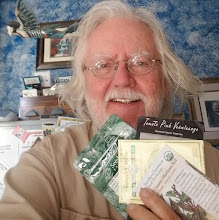The idea for the Seed Library of Los Angeles (SLOLA) has been brewing for some time and it's still not quite yet soup. However, it is now closer to reality because The Learning Garden at Venice High School has made it one of the projects they are willing to support.
A seed library works very similar to a book library. The main difference – and the big problem to make it viable – is that seeds are living entities with a life expiration. This means stock has to be dated and rotated – and some will have to be thrown out when it's too old to sprout.
As a member of a seed library, you check out seeds just like you would a book. You plant those seeds and grow out the crop, at the end of the season, you return fresh seeds,taken from your crop, to the library. The library benefits from being able to offer the next person fresh seed and you benefit from having free seeds. It's a win/win for you and your neighbors and it keeps Monsanto out of your garden and denies them profit from feeding your family. Furthermore, the seeds gradually become more adapted to our climate and soils. By choosing the best plants from the crop, like farmers used to do, we gently move the genetic makeup to suit our needs better.
The Learning Garden is the perfect place for a seed library because of the wealth of variety of plants grown there. Their gardens include a cornucopia of vegetables, California Natives and medicinal plants from which they can stock the seed library and keep it fresh.
The Learning Garden also has space to grow out seed that is getting too old to germinate.
The Learning Garden also has space to grow out seed that is getting too old to germinate.
To make this happen,the needs are, as follows:
- volunteers to run the seed library – catalog and inventory the supplies and to run the 'open' days.'
- a database complicated enough to thoroughly track the seed and insuring viability for those checking out the seed but simple enough to be used by volunteers – experiments are underway with a free database to see if it would work.
- a computer that can run that database – the Garden has an old Windows 2000 machine that might work, but it would be better to have something more up to date.
- several cabinets of some kind that can store the seeds.
So, right now, consider this a canvassing for folks who think this is a good idea and find people who want to join the seed library, people who want to help create a seed library and people who would be willing to volunteer one afternoon a month to open the seed library to the community. There may well be a $10 joining fee so the seed library can purchase supplies, but the idea is low cost seeds, so, other than fines for failing to return the seeds, just like a book late fee, there should be no other cost involved.
Let me know if you are interested – and I'll keep you posted as we move forward.
david







.jpg)